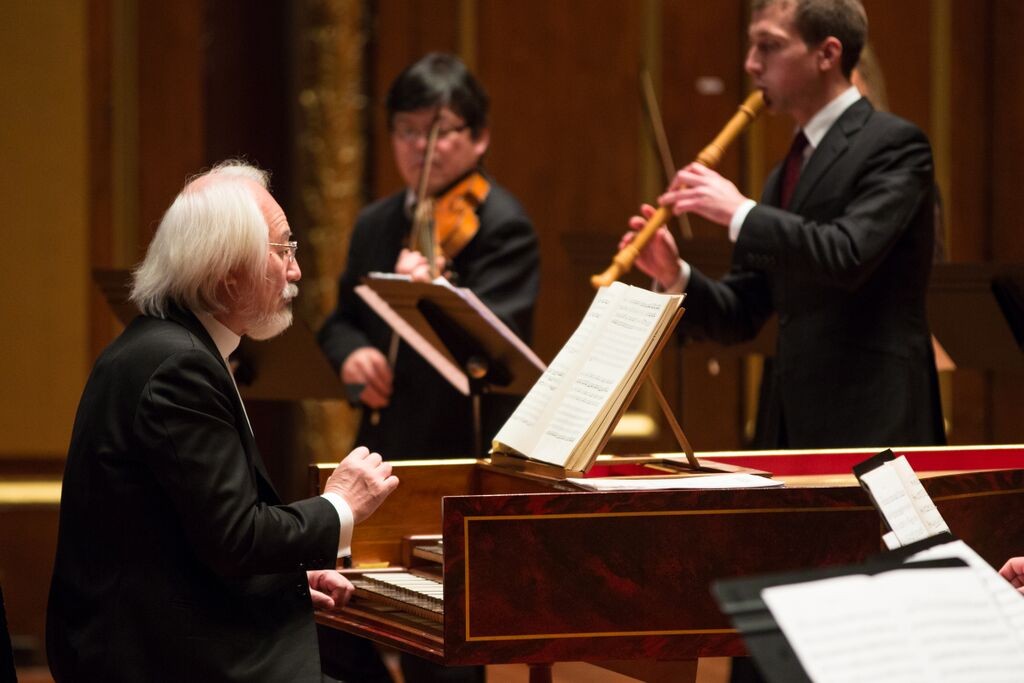Bach Collegium Japan brings graceful Baroque to Boston

Masaaki Suzuki leads the Bach Collegium Japan from the harpsichord as Andreas Böhlen performs a Vivaldi Recorder Concerto Sunday at Jordan Hall. Photo: Robert Torres
Twenty-five years ago, Masaaki Suzuki formed an ensemble to introduce historical performance practice to Japanese audiences. Today, Bach Collegium Japan stands as one the leading interpreters of the music of J. S. Bach and his contemporaries.
Sunday afternoon at Jordan Hall, in a concert sponsored by the Celebrity Series, Suzuki and his ensemble offered a light program of Baroque favorites that featured works by Bach, Handel, and Vivaldi.
Bach Collegium Japan tours with a wide number of forces, which has included a full chorus in addition to instrumentalists. Sunday’s concert featured an exquisitely balanced nonet of violins, recorder, oboe, trumpet, and continuo, with Suzuki leading from the harpsichord.
Period instruments produce an intimate sound world and the ensemble played in a tasteful idiomatic and graceful style that was never overpowering.
In fact, the musicians’ blend was ideal for the acoustics of Jordan Hall, and even the prominent clarion trumpet part of the Bach’s Brandenburg Concerto No. 2, which kicked off the concert, was absorbed into the thin veil of strings and continuo.
The work is fiendishly difficult for trumpet players, especially when played on a coiled, valveless period instrument. Handling the difficult part was trumpeter Guy Ferber, who played with a soft, smooth tone and mostly clean execution, a few missed notes apart. The piece also featured stellar playing from Masamitsu San’nomiya (oboe), Andreas Böhlen (recorder), and Ryo Terakado (violin), who exchanged sweet, rounded phrases with each other in the second movement.
The other instrumental works on the concert were showpieces for the Collegium’s fine soloists. Böhlen, who was given the solo spotlight in Vivaldi’s Recorder Concerto in C Major, RV 443, is a first-rate virtuoso in his small wooden instrument
The work demands high technical facility, and Böhlen played with astounding control of the rippling lines that make up this piece, which drew vigorous and well-deserved applause from the audience.
Vivaldi’s Oboe Concerto in C major RV 450 showed off the stylings of Masamitsu San’nomiya. His tone was warm and resonant, making for an elegant rendering of the slow movement. The oboist, too, played with firm command of the Vivaldi’s burbling passages in the outer movements.
Like the two Vivaldi concertos, Bach’s Flute Sonata in E minor involves dexterous fingerwork for the soloist.
But there are also tender moments. Flutist Kiyomi Suga floated searching melodies in the slow movements, where long notes seemed to grow organically from silence before turning into gently trickling lines. The continuo of Suzuki (harpsichord) and Emmanuel Balssa (cello) supplied soft and sensitive accompaniment.
Rounding out the program were two vocal works that featured soprano Joanne Lunn.
The highlight of these pieces was a rare Gloria, discovered in a collection of Handel manuscripts at the Royal Academy of Music in 2001. And while the jury is still out on whether or not this piece was actually written by Handel, it bears the composer’s characteristic melismatic style and opera-like drama.
Lunn sang with a soft, rosy, and almost boyish tone that brought warm resonance to the “Et in terra pax.” She was also capable of mining the internal emotional shades of this music. The free-flowing lines of “Domine Deus” were given dramatic weight through light and dark shading, and the phrases of “Miserere nobis” sounded with a touch of yearning.
Those characteristics also marked Lunn’s performance of Bach’s cantata Jauchzet Gott in allen Landen.
Bach cantatas are a specialty for Bach Collegium Japan, as the ensemble has released a complete set of the sacred works on the BIS label, a recording project that lasted almost twenty years and resulted in fifty discs.
Jauchzet Gott is a rarity in Bach’s copious output as it is scored for soprano and orchestra and involves a quasi-operatic singing style.
Lunn deftly handled the vocal flourishes that took her up to a high C. Issues with balance crept in the opening aria as her diction and phrases were sometimes buried under the full ensemble accompaniment. She fared better in the ensuing recitative, where, only backed by the continuo, she delivered clean and clear statements. Lunn’s tasteful singing capably reflected the text. Her singing of the Aria “Höchster, mache deine Güte” was especially poetic.
For an encore, Suzuki and company offered a joyous rendition of Bach’s “Wie Freudig ist mein Herz” from Cantata BWV 199.
The next classical music concert presented by the Celebrity Series will feature cellist Yo-Yo Ma and pianist Kathryn Stott in music by Bach, Schubert, Gade, Franck, Sibelius, Shostakovich, and others 8 p.m. November 17 at Symphony Hall.celebrityseries.org; 617-482-6661.